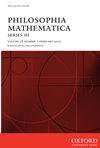什么是极值公理?
IF 0.6
1区 哲学
Q2 HISTORY & PHILOSOPHY OF SCIENCE
引用次数: 0
摘要
极值公理对公理理论的可接受模型施加极小或极大的条件。在本文中,我提出了一个基于极值公理的算术和实数分析的替代公式。二阶极值公理一旦被恰当地表述,就将理论的量词限制在极小或极大的语篇范围内。证明了极值公理分别与二阶归纳法和阿基米德完备性的标准假设在逻辑上等价。最后,我区分了以极值公理为特征的数学结构的内部主义者和外部主义者的描述及其相应的公理理论。本文章由计算机程序翻译,如有差异,请以英文原文为准。
What are Extremal Axioms?
Extremal axioms impose a condition of either minimality or maximality on the admissible models of an axiomatic theory. In this paper, I propose an alternative formulation of arithmetic and real analysis based on extremal axioms. Once properly formulated, the second-order extremal axiom restricts the quantifiers of the theory to the minimal or maximal domain of discourse. It is proved that extremal axioms are logically equivalent to standard assumptions of, respectively, second-order Induction and Archimedean Completeness. Finally, I distinguish between internalist and externalist accounts of mathematical structures as characterized by extremal axioms and their corresponding axiomatic theories.
求助全文
通过发布文献求助,成功后即可免费获取论文全文。
去求助
来源期刊

Philosophia Mathematica
HISTORY & PHILOSOPHY OF SCIENCE-
CiteScore
1.70
自引率
9.10%
发文量
26
审稿时长
>12 weeks
期刊介绍:
Philosophia Mathematica is the only journal in the world devoted specifically to philosophy of mathematics. The journal publishes peer-reviewed new work in philosophy of mathematics, the application of mathematics, and computing. In addition to main articles, sometimes grouped on a single theme, there are shorter discussion notes, letters, and book reviews. The journal is published online-only, with three issues published per year.
 求助内容:
求助内容: 应助结果提醒方式:
应助结果提醒方式:


